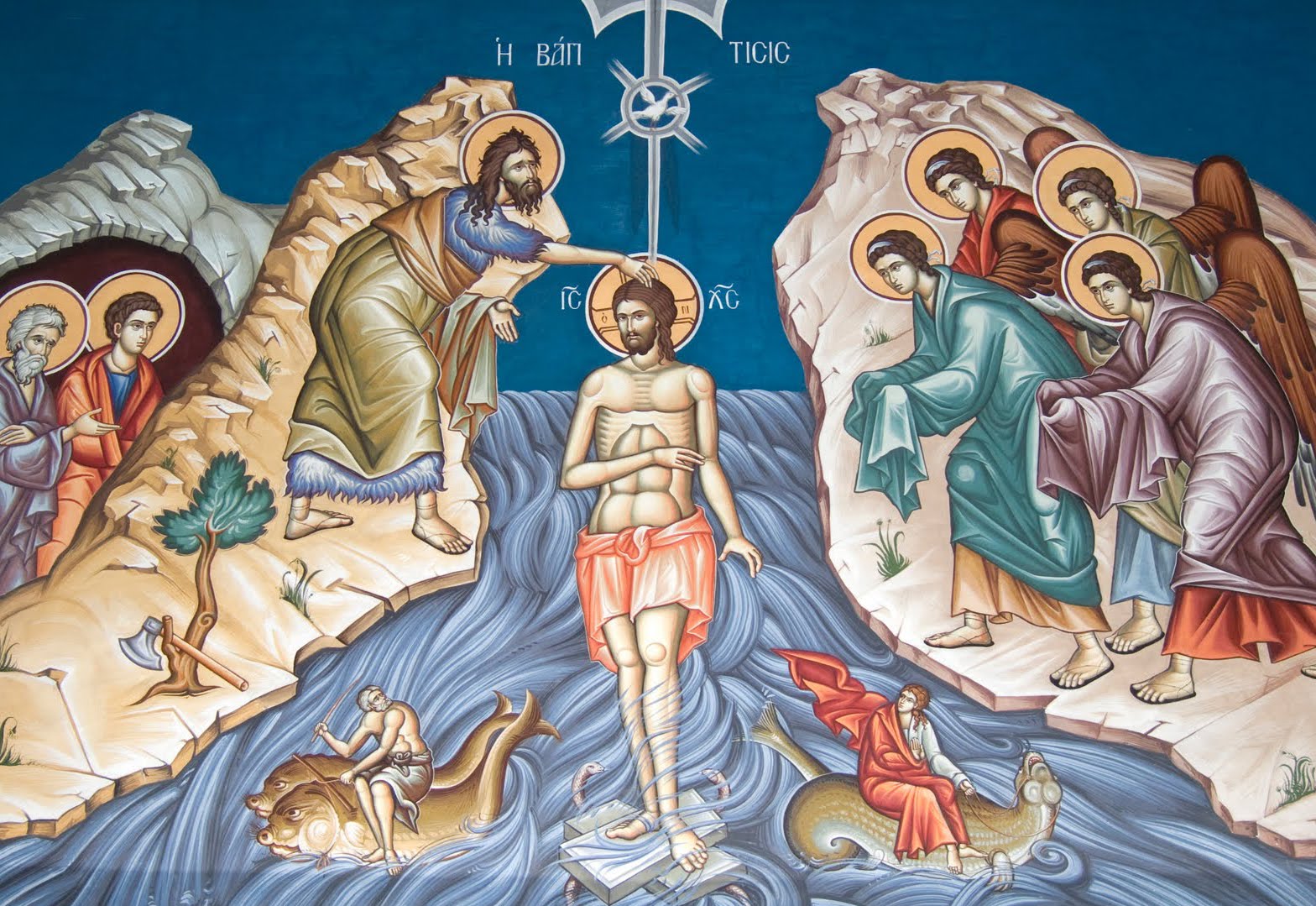Dear Brothers and Sisters in Christ,
In the fullness of time, our Lord Jesus Christ was born to the Holy Theotokos and Virgin Mary, thus entering into the world as a man and revealing Himself to mankind. Jesus was born in the city of Bethlehem in a cave, surrounded by farm animals and shepherds. St. Joseph and the Theotokos were forced to travel due to a Roman census; the odd location of the birth was the result of the refusal of a nearby inn to accommodate the expecting couple. The magi came bearing gifts of gold, frankincense, and myrrh (Matt 2:11). In the hymnography for the feast, these gifts are interpreted to signify Christ’s royalty, divinity, and suffering.
The eternal Son of God has made a way for us to participate in His divine glory by humbling Himself to be baptized the waters of the Jordan. He does so to save Adam and Eve, all their descendants, and the entire creation. St. John the Forerunner called people to repent in preparation for the coming of the Messiah (Mark 1:1-8). Christ’s preaching after His baptism focused on repentance also: “Repent for the kingdom of heaven is at hand.” (Matt 4:9-15). In order to understand the meaning of the repentance, we must first understand the nature of opposite of repentance , the reason for repentance- sin. Repentance then is not just an idea, a thought, it is above all an action. Repentance is a change of mind which leads to a practical and visible change in our way of life.
Christ brought salvation to the sinful man Zacchaeus, and his life was changed simply because he “sought to see who Jesus was” (Luke 19:3). The desire and effort to see Jesus begins the entire movement through Lent towards Pascha. It is the first movement of salvation. Our lenten journey begins with a recognition of our own sinfulness, just as Zacchaeus recognized his. Like Zacchaeus, we will not be saved until we too are small and understand that in order to see Salvation, we must first climb up into the tree of repentance, up onto the cross of humility, bringing the fourfold fruit of repentance.
Two men went to the Temple to pray. One was a Pharisee, an externally decent and righteous man of religion, and the other was a publican, a sinful tax-collector who was cheating the people. Though the Pharisee was genuinely righteous under the Law, he boasted before God and was condemned. The publican, although he was truly sinful, begged for mercy, received it, and was justified by God (Luke 18:10-14). On the Sunday of the Publican and Pharisee in the preparation for Great Lent, Orthodox Christians are to see that they have not the religious piety of the Pharisee, but the repentance of the publican. They are called to think about themselves in the light of Christ’s teaching.
Prayerfully,
Fr. Mile
Драга браћо и сестре у Христу,
Господ Исус Христос се родио од Пресвете Дјеве Марије, када се навршила пуноћа времена, и тако ушао у свет као човек да се открије људима. Христос се родио у пећини у Витлејему, окружен пастирима и домаћим животињама. Богородица и Праведни Јосиф су морали да путују због римског пописа становништва. Место рођења није било згодно, због немогућности да се пар смести у оближњем коначишту. Мудраци са Истока су донели дарове злата, тамјана и смирне (Мт 2, 11). У празничним песмама ови дарови представљају Христову царску службу, божанску службу, и Његово страдање.
Превечни Син Божији је благоизволео да се прослави тако што се унизио да буде крштен у водама Јордана. Учинио је то да спасе Адама и Еву, њихове потомке и читаву творевину. Св. Јован Претеча је позивао људе да се покајањем припреме за долазак Спаситеља (Мк 1, 1-8). Христова проповед након крштења је такође позив на покајање: ”Покајте се јер се приближило Царство Божије.” (Мт 4, 9-15). Да бисмо разумели значење покајања, морамо да разумемо оно што је супротно покајању, односно разлог за покајање, а то је грех. Према томе, покајање није само идеја, или мисао, него пре свега делање. Покајање је промена ума која доводи до конкретне и видљиве промене нашег начина живота.
Христос је донео спасење грешнику Закхеју, и његов живот се променио само зато што је тражио да види ко је Исус Христос (Лк 19, 3). Жељом и напором да се види Христос, почиње труд кроз Велики пост до Васкрса. То је наш први помак ка спасењу. Наше великопосно путовање започиње спознајом да смо грешни, као што је то препознао Закхеј. Нећемо да се спасемо уколико не будемо мали као Закхеј. Да бисмо видели спасење, треба да нам је јасно да морамо да се попнемо на дрво нашег покајања, на крст унижења, доносећи четвороструки плод покајања.
Два човека су отишла у храм да се помоле. Један је био фарисеј, по спољашњости пристојан, праведан и побожан човек. Други је био порезник, грешник који је варао људе. Фарисеј је углавном био праведан пред старозаветним законом, али је величао себе пред Богом, и због тога био осуђен. Иако је у суштини биогрешан, порезник је молио за милост, због чега ју је и добио, и био оправдан пред Богом (Лк 18, 10-14). У Недељу порезника и фарисеја, у припреми за Велики пост, Православци треба да увиде да не трба да имају побожност као фарисеј, него покајање као порезник. Треба да гледамо на себе у у светлу Христовог учења.
Молитвено,
свешт. Миле


